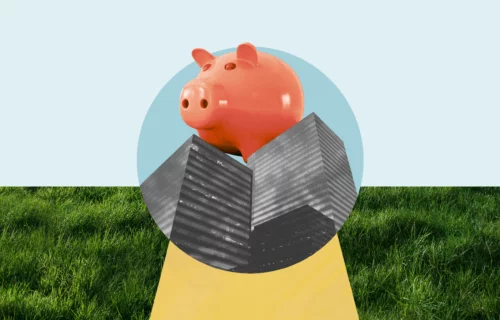We all know it. Money is a difficult and sometimes even scary thing. This fear is not misplaced. It’s easy to make mistakes when it comes to financial decisions, especially when investing money.
To shine some light on common pitfalls, Inyova invited Olga Miler to join one of our online events. Olga is the co-founder of SmartPurse, a platform for financial education. She shared her knowledge from 17 years in the financial industry with our community and explained how irrational behaviour can sabotage your investment efforts.
Here are the 6 most common investment mistakes – and what you can do to avoid them!
Mistake 1: We’re scared, so we never start
Fear and greed are the two emotions that we all feel when it comes to investing. We all want to invest in something that will have a great performance, but sometimes we are so scared to invest in the wrong thing or to make mistakes that we don’t even start. Not investing is the biggest mistake of all when it comes to investing, as you’ll miss out on all the potential gains you could make.
The best way to overcome your fear is by starting small. Your first investment does not have to be a big percentage of your wealth. Start as small as you want and familiarise yourself with investing until you feel more comfortable with it.
Mistake 2: We value the present more than the future
Investing is a marathon, not a sprint. The most important factor contributing to a big gain in your portfolio is TIME. As the saying goes, “The best time to invest was 20 years ago. The second best time is right now”. The problem? Investing means you can’t spend money on other things.
It is a common phenomenon that we value the present more than the future. Even if we know that it’s important to put money aside for the future, we don’t want to miss out on the satisfaction of buying something today. This is called the present bias.
To counter present bias, try setting up an automatic transfer to deposit money into an investment account every pay day. As countless behavioural psychologists have noted, you won’t miss that money. Because it automatically moves into your investment, you’ll never experience the negative emotions around “giving it up”.
Mistake 3: We ride the market rollercoaster
Do you remember when the price of Bitcoin started rising like crazy? You probably considered buying some. But then, there was also a time when the price fell, by a lot. If you hadn’t bought any Bitcoins, you might have felt vindicated. Many sold their Bitcoins at a much lower price – and made a huge loss.
Olga Miler describes this process as “riding the market rollercoaster”. Anyone, but specifically investment beginners, can make this mistake: you buy when the price is high and sell when the price is low, harming your overall investment strategy.
Long-term investment mainly requires one thing: patience. Remember: selling when prices are low turns ‘paper’ losses into real losses. Instead of panicking, take a deep breath and take a step back. If you are an Inyova customer, your investment strategy is designed with the knowledge in mind that market dips can – and do – occur. There are good years on the stock market, and there are bad years. But investors who hold their investment for a period of 10, 20, or even more years have historically earned around 6% annual returns on average. Have a look at the graph in this article to see how the stock market has developed over the last 20 years.
Mistake 4: We only invest in “fun” stocks
Behavioural economists call this phenomenon the narrative fallacy. If you see a list of 100 stocks and can choose to invest in any of them, you will most likely be drawn to the 10 with the most familiar names first. It’s very human to be appealed by a stock like Nike or L’Oréal rather than AAK or GlaxoSmithKline: we love anything that’s familiar or that has a cool story.
While there is nothing wrong with investing in companies that you love, you have to make sure that your portfolio is well diversified. At Inyova, we always make sure that every portfolio contains 30-40 different companies, spread across different regions, industries, currencies and other factors. When investing by yourself, it’s easy to only buy stocks of companies you know. Just knowing about the narrative fallacy will hopefully help you to avoid this mistake.
Mistake 5: We are overconfident
Doesn’t this mistake contradict the “We are scared” mistake? A little bit, but stick with us. Being overconfident is a mistake that many people make after having invested by themselves for a while. If you bought a stock at, for example, CHF 50, and after a few months it’s at CHF 75, you will feel like the next Warren Buffett.
Suddenly, you will feel like all your financial predictions are true, and you’ll forget about the other stocks you bought that are now actually decreasing in value. Again, this is a very human mistake. Behavioural economists call it the hindsight bias. We perceive events as being way more predictable than they actually are and consequently feel overconfident for future predictions.
An easy solution to this is giving yourself and your stocks a sanity check from time to time. Did you actually predict the performances, or did you just get lucky? And when thinking about great stocks to buy, focus on creating a portfolio that’s diversified. This way, you avoid being over-exposed to downturns in individual companies or particular industries (ever heard of the Dot Com Bubble?).
Mistake 6: We don’t talk about money
This isn’t specific to investing but to anything related to money. Yes, talking about money is uncomfortable and awkward. According to clinical psychologist Professor Tanya Bryon, money is a taboo topic and embarrassing for most adults to talk about. However, not talking about money is one of the biggest mistakes you can make, as you miss out on opportunities to learn and gain confidence. An easy solution: Try approaching financial questions with your friends and family. You will be amazed by the different perspectives you encounter, gaining more confidence through learning from different people. Don’t know how to start a conversation about money? We recommend dropping a word about sustainable investing next time you find yourself discussing climate change or vegan lifestyles with a friend. If you’re already an Inyova investor and your friend starts to invest sustainably with Inyova because of you and your conversations about money, the two of you will even benefit from six months of free investing!



